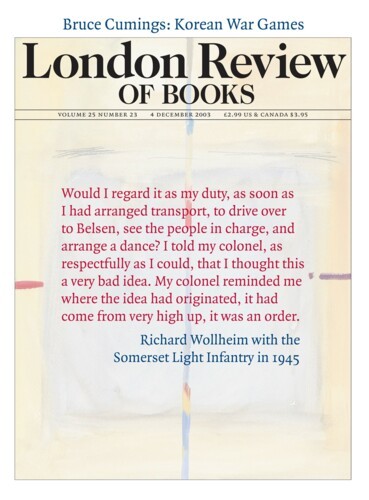In urgent need of an antidote to Paul Burrell’s memoir (see Short Cuts, 20 November), I hurried down to the London Review Bookshop to pick up a copy of Henry Green’s Loving. The recent (2000) Vintage Classics edition seemed as good a bet as any: it has a nice picture of a peacock swanking on the cover, and costs only £6.99. Loving, first published in 1945, is concerned with the lives of the servants in an Anglo-Irish country house during World War Two. Mrs Tennant, the mistress of the house, is away in London for much of the book, visiting her son who is on leave from the Army. Her daughter-in-law hurries off to join them a few days earlier than planned, after Edith, one of the housemaids, discovers her in bed with a neighbour, Captain Davenport. The servants, meanwhile, are left to their own devices, conducting power struggles and love affairs among themselves, and anxious about an imminent German invasion or an attack by the IRA. Mrs Welch, the cook, forbids her girls from speaking to tradesmen on prevention of terrorism grounds, though it turns out that her real motive is safeguarding the secret of her illicit gin supply. Charley Raunce, the former head footman recently promoted to butler, continues his predecessor’s practice of skimming a few pounds off the household accounts every month.
A sentence at the bottom of the first page puzzled me for a while: ‘Not cut of that room I couldn’t.’ Green’s dialogue is remarkable for the extent to which it appears to resemble the way people actually talk, but it’s rarely so realistic as to be unintelligible. I flicked to the back of the book, hoping Albert the pantry boy’s patois might be explained in the notes. There were no notes. Finally it dawned on me that the sentence actually said: ‘Not out of that room I couldn’t.’ Unfortunate that there should be a typo on the first page, I thought, though Vintage deserve some credit for bothering to reset the novel in fresh type, rather than just reprinting an old, worn-out edition in facsimile (as they have done with, for example, the novels of Graham Greene). Then on page 2 you get ‘Only then could lie see that she had stuck a peacock’s feather above her lovely head’ instead of ‘Only then could he see’, and so it continues throughout the novel: there is pretty much a mistake per page. Raunce is frequently called ‘Chancy’, though that isn’t obviously an error, since he says he’s known as ‘Lucky Charley’. Dropped aitches cause a particular problem: I lost count of the number of times ‘’cart’ appears instead of ‘’eart’, ‘’card’ instead of ‘’eard’, ‘’C’ instead of ‘’e’ etc. Letters are randomly capitalised; ‘comin’’ is regularly rendered ‘comm’’; speech marks are missing; full-stops have disappeared from the ends of some sentences only to crop up in the middle of others; ‘mother-in-law’ is mangled into ‘motherin-]aw’; and when it comes to the scene in which the servants are sitting around the table doing impersonations of the lisping insurance agent who comes to the house to investigate the loss of one of Mrs Tennant’s rings, we have ‘foolitlineth’, ‘mutlit’ and ‘’iglily ditlitrething’ in the space of a few paragraphs. The problem, as anyone who has ever used a scanner will have guessed, is that even the best optical character recognition (OCR) software sometimes gets it wrong. It seems extraordinary that Vintage, the major paperback imprint of Random House, should not have had the book properly proofread. If the budget really wouldn’t stretch to it, they’d have done better to dispense with Sebastian Faulks’s introduction.
It is a minor disgrace that an edition of one of the better novels of the 20th century should be so strewn with typographical errors. But it’s hardly a disgrace of the same order of magnitude as the thousands of police man-hours and millions of pounds being lavished on corralling George W. Bush’s London carnival. It is almost too shaming for words that the British public should find themselves unwitting donors to the re-election campaign of this most lousy of Presidents. There was some small consolation in knowing that, in the event of Bush being wounded or taken ill, he wouldn’t be a drain on NHS resources. He brought his own mobile medical unit, and a supply of American blood. On a visit to Britain in the 1950s, de Gaulle brought a few bottles of French blood with him, so as not to be contaminated with inferior cross-channel plasma if he required a tranfusion. Macmillan didn’t have a refrigerator, so the blood was stored in the squash court. No such problem for Bush: his spare blood is in the fridge in his armoured cadillac, alongside the cans of Diet Coke.
The LRB has received a sheet of puffs for The Chief, David Nasaw’s Life of William Randolph Hearst (Gibson Square, £9.99), including one from Conrad Black in the Scotsman. That would be the same Conrad Black who wrote the book’s foreword. A helpful yellow post-it note reads: ‘FYI Conrad Black in the news’. Indeed he is; but I wouldn’t have thought he’d thank the publicity department for reminding people of it.
Send Letters To:
The Editor
London Review of Books,
28 Little Russell Street
London, WC1A 2HN
letters@lrb.co.uk
Please include name, address, and a telephone number.

